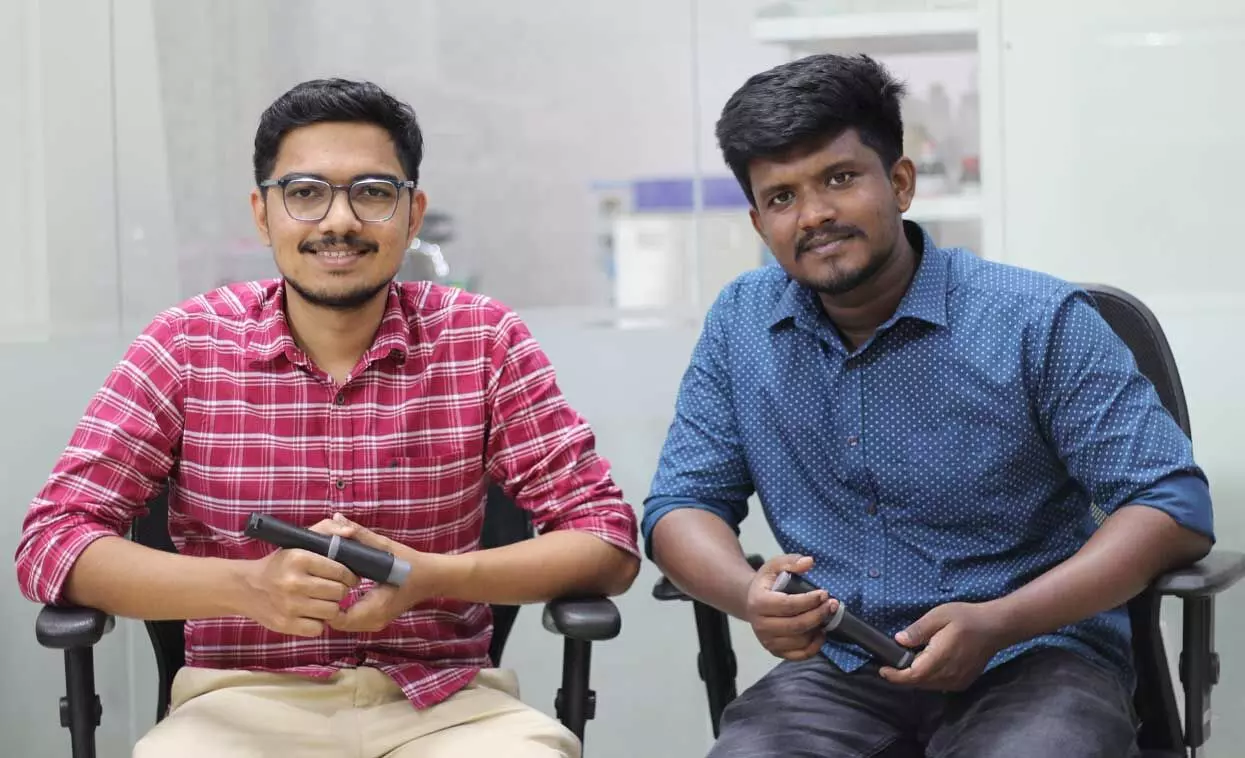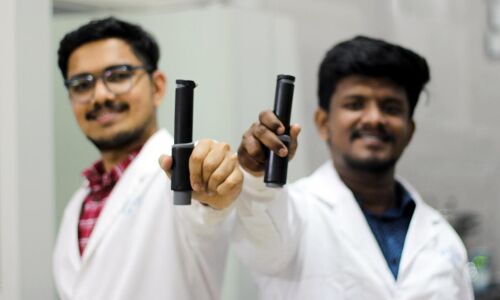Two Indian student innovators announced as the National Winners of James Dyson Award 2022
Two Indian student innovators announced as the National Winners of James Dyson Award 2022
Two Bangalore based Engineering students, Arjun B S and Ajay Krishnan A, have been announced as ‘National Winners’ of the prestigious James Dyson Award 2022; for their unique innovation EpiSHOT – a reusable epinephrine autoinjector for patients suffering from a severe and potentially fatal systemic allergic reaction that occurs suddenly after contact with an allergen. The James Dyson Award encourages students across 28 countries to design something that solves a problem. Clever yet simple engineering principles that address clear problems are what a winning James Dyson entry looks like.
The latest edition in India saw the participation of numerous young and bright engineers with innovative entries, trying to solve real-life problems. The national winners, Arjun B S and Ajay Krishnan A will receive prize money of approximately INR 4.6 Lakhs (£5,000) and will also represent India in the International round where final winners will be handpicked by Sir James Dyson, giving a life-changing chance to talented young innovators to give life to their disruptive concepts. With the help of the prize money, the national winners aim to further modify EpiSHOT further for commercialization. This step will enhance the manufacturability, reliability, and portability of EpiSHOT while reducing the cost of the device.
Arjun says, “Allergies are prevalent among the Indian population, but no one believes that a simple allergic reaction could be life-threatening if not treated immediately. India, till-date, does not have an immediate solution to anaphylaxis, which shows preponderance for the age group 20 – 40 years. Due to existing market monopolies, huge price tags of single-use autoinjectors and safety concerns for self-use, there remains a greater need for a safe and cost-efficient solution. EpiSHOT aims to bridge this gap. The challenge of developing such a much-needed device was given to us by Dr. Paramesh H, a paediatric pulmonologist who had spent decades trying to popularize epinephrine as an emergency response medication. We strongly believe that the James Dyson Award will be our stepping platform to get recognized, educate and mass materialize our lifesaving innovation.”

Ajay mentioned, “The design of EpiSHOT underwent multiple design iterations, with a few iterations made as prototypes. From adding a safety cap to the simple reusable single-hand-operated autoinjector to prevent accidental injection, to adding an automatic needle retraction mechanism to the design, from redesigning the syringe cartridge to prevent exposure to bodily fluids and more, multiple additions were made to the baseline design. More than a hundred tests were done on tissue phantoms to ensure complete safety of use.”
The EpiSHOT will progress to the international stage of the James Dyson Award 2022, and Arjun B S and Ajay Krishnan A aim to commercialize this product via a start-up. The intellectual property has already been protected through patent applications. The team is looking at potential pharmaceutical partners to use the technology for allergic and other drug delivery applications. The team is also developing similar technologies compatible with intradermal (DermiSHOT), subcutaneous, and intramuscular injections. Arjun (Ph.D. scholar) and Ajay (Project Assistant) work in the Biomedical and Electronic Engineering Systems Laboratory (BEES LAB), led by Prof. Hardik J. Pandya at the Department of Electronic Systems Engineering, Indian Institute of Science, Bangalore. The lab is focused on developing innovative technological solutions for unmet clinical challenges through research in science and engineering.
The International shortlist will be announced on 12th October 2022, and the international winners on 16th November 2022.
The Winner: EpiSHOT
The winning innovation, EpiSHOT is a single hand-operated autoinjector to deliver emergency medicine intramuscularly or subcutaneously to treat life-threatening situations like anaphylaxis with the provision for reloading and sterilization for reuse within 2 minutes of first use.
· Allergic reactions or Anaphylaxis is a common medical emergency and a severe life-threatening reaction. This can occur within minutes or even seconds of exposure to some commonly found things such as peanuts, bees etc.
· Many times, this allergic reaction could become fatal within seconds without prompt treatment and due to rapid and progressive respiratory collapse. Every year, a substantial number of deaths are caused by anaphylaxis. The primary allergens that trigger allergies are common in all populations.
· Without the immediate administration of epinephrine, a quick remedy for Anaphylaxis, those with a severe allergic reaction can go into anaphylactic shock, which can be fatal.
The significant gaps have been the high price tag of single-time use injectors, safety concerns for self-use, and ease of operation.
The winners, Arjun B S and Ajay Krishnan A started addressing the challenge to develop EpiSHOT, a product that can be translated into the market as a safe, reusable, affordable, and easy-to-use lifesaver. The device consists of a pre-filled syringe cartridge with the drug and an injection mechanism. The design of EpiSHOT had undergone several design iterations, with a few iterations made as prototypes. Through multiple clinical consultations, the design began with a simple reusable single hand-operated autoinjector as the base with the addition of multiple features such as a safety cap, an automatic needle retraction mechanism etc. The device’s ergonomics were tested more than a hundred times in tissue phantoms. For EpiSHOT’s investors, safety and re-usability became the building blocks for his design.
Link of video on the winning invention: EpiSHOT
The Runners Up – THE THERMAL FLOATER
Problem: Present technologies use inefficient methods to generate energy from solar heat. They use large spaces of land to build a solar-thermal factory and use the concentrated heat to boil water, creating steam & rotating the turbine. Still, a large amount of energy is lost in the conversion process.
Solution: Using the Peltier module that works on the Seebeck Principle, one can produce an electric current. The Seebeck Effect states that electricity can be generated when two dissimilar metals are joined, and one side of their junction is cooled while the other is heated. Since the Peltier needs a temperature differential to function and produce electricity, the cooling mechanism is attached to a heatsink further in contact with the water body, which causes the hotter electrons to move to the colder side. So, this system converts the thermal energy into a high-power output with voltages enough for powering various household devices. It has a modular design & can easily be connected with similar modules to create an array for supplying power to the utility. The thermal floater originally started as an idea and has developed into a product with the potential to change the renewable energy market entirely.
The Runners Up – KUDARAT BIOLEATHER
Problem: Food waste ends up in the landfills, rots & releases harmful greenhouse gases such as methane, contributing to global warming. Similarly, fibre waste from the textile industries pollutes water bodies, enters our food chain and harms life on land & underwater to a large extent.
Solution: A new material that utilizes renewable natural resources & helps in waste management. Kudarat Bioleather focuses on the aspects of circular design, sustainability and environment consciousness. A sustainable loop has been attained through the material development process, keeping the sustainable development goals (Climate action, Life on land & Life underwater) in mind, where all the raw materials are sourced from nature ranging from algae, nutrient-rich fruits/vegetable peels that we throw away, and it goes back to the nature once it’s purpose is served (biodegrade: 8-12 weeks). The development of material does not require large land or water resources and does not lead to carbon emissions. It is free from chemicals and the production requires temperature below 100 degrees & is energy efficient. It resembles traditional leather in texture, look & feel and holds great strength, flexibility, durability, antimicrobial and water-resistant properties. It is aimed to be used for industries such as textiles, lifestyle accessories, furniture and footwear.
James Dyson Award
The James Dyson Award forms part of a wider commitment by Sir James Dyson, to demonstrate the power of engineers to change the world. The Dyson Institute of Engineering and Technology, the James Dyson Foundation and James Dyson Award encourage aspiring engineers, to apply their knowledge and discover new ways to improve lives through technology. To date, James Dyson has contributed over £140m to boundary-breaking concepts in education and other charitable causes. The James Dyson Award has supported over 300 inventions with prize money, and is run by the James Dyson Foundation, an engineering-education charity funded by Dyson profits.

